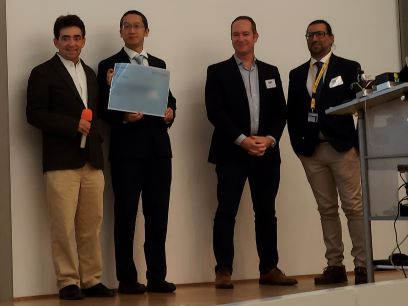FRIB’s Junwei Guo awarded Richard Geller Prize at ECRIS24

Share this article:
Share this article:
Junwei Guo, ion source scientist at FRIB, has been awarded the 2024 Richard Geller Prize. Guo received the honor at the 26th International Workshop on Electron Cyclotron Resonance Ion Sources (ECRIS). The Geller Prize—established in 2008—recognizes outstanding contributions to the development of ECR ion sources and encourages promising young scientists. An international group of scientists selects the recipient.
Guo came to FRIB as a research associate in 2021. His work focused on completing the construction and commissioning of the 28 gigahertz (GHz) superconducting ECR ion source for high-power operation (HP-ECR). Guo became an ion source scientist at FRIB in 2021 and led the successful commissioning of the FRIB HP-ECR at 18 GHz, which transitioned to operation in early 2023. Guo said that being a part of FRIB has provided an advanced platform for his research.
“I am very pleased and excited to receive this award, and I thank the committee for recognizing my work in the field of ECR ion sources,” Guo said. “I am truly grateful to my colleagues and mentors who have supported me along this journey. This award is a milestone in my career and will inspiring me to continue striving for excellence.”
Prior to his arrival at FRIB, Guo earned his PhD in nuclear technology and applications from the Institute of Modern Physics (IMP) in Lanzhou, China. While working at IMP, he researched the effect of microwave coupling to 24/28 GHz ECR ion sources. He is the first scientist in the ECR community to investigate the optimal waveguide size and the asymmetric Vlasov microwave launcher for injecting high-frequency and high-power microwaves into an ECRIS. He is also the first to design and build an air transmission line for coupling a 45 GHz microwave beam into an ECRIS. Guo has presented his results at several conferences – notably ECRIS and the International Conference on Ion Sources (ICIS) – and has published them in peer-reviewed journals such as Review Scientific Instruments. He received the Young Scientist Award at ICIS in 2019.
“Junwei is a very bright, talented, and innovative researcher. It is rare to encounter somebody who is both able to develop and investigate new ideas with a rigorous scientific mindset while able to solve very challenging engineering problems with very high engineering standards,” said Guillaume Machicoane, front-end department manager at FRIB and member of the Geller Award selection committee. ”He is at the forefront of the next generation of researchers who will make the fourth generation of ECR ion sources a reality and, in the process, will lead to many new results in the field of ECR ion sources.”
Hosted by the GSI Helmholtz Centre for Heavy Ion Research, ECRIS24 took place 15-19 September in Darmstadt, Germany.
Michigan State University (MSU) operates the Facility for Rare Isotope Beams (FRIB) as a user facility for the U.S. Department of Energy Office of Science (DOE-SC), with financial support from and furthering the mission of the DOE-SC Office of Nuclear Physics.
The U.S. Department of Energy Office of Science is the single largest supporter of basic research in the physical sciences in the United States and is working to address some of today’s most pressing challenges. For more information, visit energy.gov/science.

Junwei Guo, ion source scientist at FRIB, (second from left) has earned the 2024 Richard Geller Prize. Guo received the award at the 26th International Workshop on Electron Cyclotron Resonance Ion Sources (ECRIS). Pictured with Guo is Benoit Geller, son of Richard Geller (far left), Mathieu Cavellier of Pantechnik (second from right), and Fabio Maimone, chair of ECRIS 2024 (far right).

